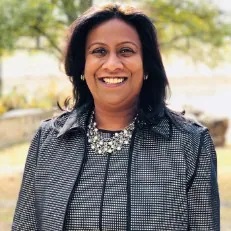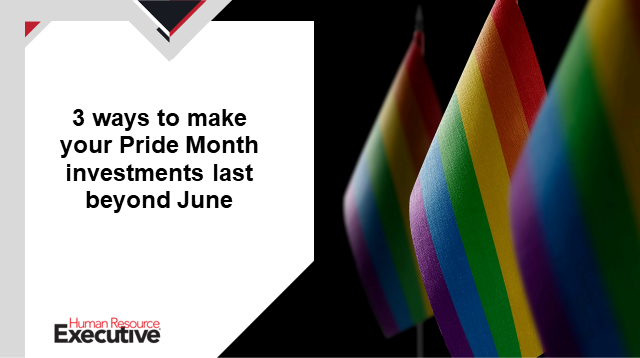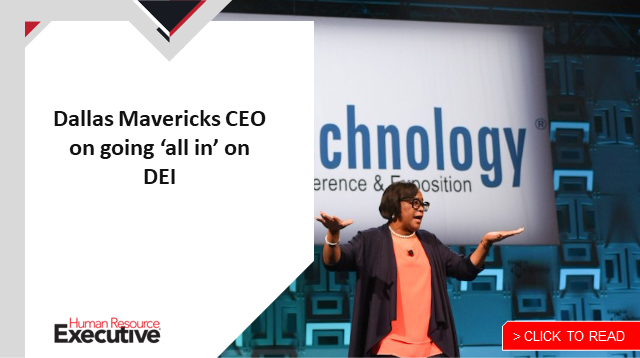Investment in people analytics is increasingly being seen as table stakes for organizations serious about advancing equity in their organizations. But simply measuring isn’t enough—business leaders must be willing to share their people data and use them to take solid action, says Kavitha Prabhakar, principal and chief diversity, equity and inclusion officer at global advisory firm Deloitte.
That’s a commitment Deloitte has embraced in the last few years. In 2021, it published its first DEI Transparency report and recently released the second incarnation, a deep, data-driven dive into the DE&I progress and improvements needed across the enterprise. Its new Equity Imperative report uses lessons learned from Deloitte’s work in this area for a wide-ranging guide for employers looking to advance equity within their organizations.
Prabhakar recently shared with HRE what the organization has learned from its push for transparency and how it plans to evolve this goal in the coming years.
HRE: Last year was the first DE&I Transparency Report. Were there any lessons learned from that process that helped inform the process this time around?

Prabhakar: Oh, absolutely. The first time took a lot of courage. It was about putting your data out there, not just for your people to consume but for the world. The absolute benefit of that is that everybody is then operating from the same baseline. That’s what transparency does for you; it gets everyone on the journey to engage in the change and the positive momentum. So, when I think about this year to last year, the thing that was important is the frame of mind of how you continuously push for more transparency. When you set a baseline of, “OK, let’s be transparent about these 40 things,” then it’s, “Am I going to be consistently transparent about the same 40 things or am I adding more?” Some of the things we talked about this year, like pay equity and more transparency on topics like attrition, we got more confident in, especially given how our people responded and appreciated understanding the state of the state.
HRE: Why was the theme the “Year of Allyship” chosen as a DE&I framework for the coming year at Deloitte?
 Prabhakar: Year one was about transparency and year two about accountability. Now, we’re very much focused on helping people see that everyone has a role in making this change. For equitable outcomes, you need equitable opportunities. For equitable opportunities, you need allies to be advocating, to be actively engaging and creating platforms for impact for our people. We say allyship is a verb; it’s not a destination or a badge you can self-assess or declare. Others have to see you as such.
Prabhakar: Year one was about transparency and year two about accountability. Now, we’re very much focused on helping people see that everyone has a role in making this change. For equitable outcomes, you need equitable opportunities. For equitable opportunities, you need allies to be advocating, to be actively engaging and creating platforms for impact for our people. We say allyship is a verb; it’s not a destination or a badge you can self-assess or declare. Others have to see you as such.
We are a large organization and our culture, if I may say so, is pretty amazing; it’s been our strength for generations, through our entire 177 years. We have a lot of great people—really good humans—but, for allyship to be effective, we’ve got to move from the quadrant of “do no harm” to really engaging. Just thinking, “I’m not adding to the problem, I’m a good person” is not enough. How are you using your power, your influence to lean in, to activate, to advocate, to be an ally? That has to be a shift in mindset. Changing mindsets is how you show up as an ally, and it’s an important learning journey for our people.
HRE: In terms of your 2025 goals, what do you think sets your particular goals—or how you plan to go about achieving them—apart from other organizations striving for DE&I progress?
Prabhakar: First, we have a mix of representation/rate of change goals as well as what I would call experience or sentiment goals. That, to me, has been very important. It’s not just about having a diverse workforce, but what is their experience? What is their set of sentiments about the organization? You have to measure that. You want people to belong, to truly feel like they’re being given opportunities and seen and valued for who they are, and those sentiment elements can be measured and goals set around that, and we have done that. The balance between [representation and sentiment goals] is something I’m extremely proud of.
Second, our goals have more than talent at their core. I’ll give you an example. We have very clear supplier diversity goals; it’s not just about our people but how we show up in terms of impacting society and the marketplace with our purchasing power. That [focus on supplier diversity goals] is distinct.
I’m also very proud of how easy we’ve made it for our people and our clients and the market to see how we’re progressing—whether it’s good news or bad news. When you look out there, I’ve noticed that not many other organizations are that direct. Our DEI report is simple; if you don’t read anything else, just look to the progress section and it gives you a good view of how we’re progressing against our goals.
HRE: How much has the pandemic influenced or changed your overarching DE&I strategy—particularly when it comes to recruiting and retaining women?
Prabhakar: Just yesterday, we had a discussion with the executives on our progress and continued investment when it comes to our women. We’re recognizing that there are patterns in a hybrid model—who shows up, where they show up, when they show up—that we’re continuing to gather data around and that need to be understood through different lenses of the workforce. What are the trends we see with our women? What about with women of color? And Black professionals? As we move into more and more of what’s the new normal, we have to understand if there are any disparate impacts to these cohorts.
Another thing we’re thinking through is a focus on hire to train. When you think about technology fields—a lot of our work has a technology bend to it, especially in the consulting and advisory businesses; we recognize that there has been a decline in the number of women in the computer science or engineering fields. We’re thinking about a huge investment in hire to train, where we train women in AI, cloud or ESG, whatever the case may be, and how to continue to create a pipeline of ready-now women to enter the workforce, especially in technology fields.
It’s also important to understand what I would put more into the category of “changing mindsets”: how we continue to push societal pressures on our women to be caretakers. We need to really deconstruct what the home expects and work to give more support to women. For instance, one of the things we’re exploring from a benefits perspective is concierge services to help women more completely achieve that balance. So, we’re thinking about different approaches to childcare services, family leave—which is one of the best in the industry, in my mind, but is it enough? To create that pipeline, we have to keep thinking about the entire experience in the arc of the lifecycle and what is the support needed. That’s not new; it just needs to be refreshed post-pandemic.
HRE: How do you think your own identity has helped to shape how you’ve approached DE&I work throughout your career?
 Prabhakar: I was born and raised in India. I came to the U.S. when I was 17, alone, with no family here—and no internet, as I like to tell my children. It was to pursue a dream. When I think about my journey, I have significant awareness of how much the intersection of who I am and how much I put into both my career and my personal life has created a beautiful picture today. But it has been about seizing opportunities that were offered. Those opportunities came at the right time from the right people with significant support and advocacy from a set of sponsors. To have all of that has been a gift and a blessing. I understand the kind of impact of that—when people with power and privilege have shared it in meaningful ways in my life. I think a lot about that and about many others needing it.
Prabhakar: I was born and raised in India. I came to the U.S. when I was 17, alone, with no family here—and no internet, as I like to tell my children. It was to pursue a dream. When I think about my journey, I have significant awareness of how much the intersection of who I am and how much I put into both my career and my personal life has created a beautiful picture today. But it has been about seizing opportunities that were offered. Those opportunities came at the right time from the right people with significant support and advocacy from a set of sponsors. To have all of that has been a gift and a blessing. I understand the kind of impact of that—when people with power and privilege have shared it in meaningful ways in my life. I think a lot about that and about many others needing it.
I also have a significantly different upbringing from a cultural perspective. So, what it means to belong has been a lifelong pursuit of mine. At Deloitte, we have this narrative around evolving together—it’s not just about how people fit in our culture, but what they can add or bring to it. I deeply believe that. It’s not just, “Here is our culture so here’s your parameters and the box to fit in.” No, you’re adding to our culture. That, to me, has been a core aspect of my personal journey that I’ve brought to the organization and how we think about DE&I.
HRE: What is your approach to trying to achieve balance in your professional and personal lives?
Prabhakar: Two things. One is transparency and vulnerability to be very, very open about both what’s happening and what I need or what choices I’m making. It’s been very important for me to have that. And the second that is probably pretty related is authenticity. Those things have helped me not have to create unnatural boundaries or veneers in how I show up at home and how I show up at work. That’s been part of my journey, part of who I am, and it’s truly been a source of strength and personal success.

